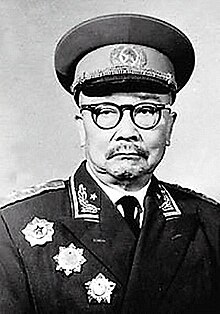Li Kenong
| Li Kenong | |
|---|---|
 |
|
| Born | April 1899 Chaohu, Anhui Province |
| Died | 1962 Beijing, China |
| Allegiance | People's Republic of China |
| Years of service | 1926–1962 |
| Rank | General |
| Commands held | Director of National Security Bureau |
| Battles/wars |
Northern Expedition(1926–1928) Chinese Civil War (1946–1950)Korean War(1950–1953) |
| Awards | Order of Liberation, Order of Independence and Freedom, Order of the Army |
Li Kenong (李克农, 1899–1962) was a major figure in the early history of Chinese Communist intelligence, and was rewarded the rank of General in 1955.
Born in Chaohu County, Anhui Province, Li was also known as Li Zetian and Li Leizhong. He became the deputy editor of the Anqing Guomin Shibao (National People's Daily) in 1926, entering the Chinese Communist Party (CCP) in 1927. In this same period Li became a local propaganda leader for the Chinese Nationalist Party (KMT) in the same locality, and performed local coordination for the Northern Expedition. After the CCP's break with the KMT in April 1927, Li travelled to Shanghai in 1928 to do newspaper work for the communists on the Tieshenche Bao and the Laobaixing Bao newspapers.
Li was an early agent of Zhou Enlai, via the Communist intelligence agency, "Teke". Along with fellow agents Qian Zhuangfei and Hu Di, Zhou often referred to Li as one of "the three most distinguished intelligence workers of the Party". Under Zhou's direction Li joined the KMT secret police as a mole by the end of 1929. Li was soon placed in charge of investigation Communist activities, and was provided with carefully selected information (and disinformation) about the activities of parties hostile to the KMT. The information provided to Li was carefully controlled by Zhou Enlai. Li also reported to Zhou on the plans of Chiang Kai-shek.
Beginning in 1929, under the direct order of Zhou Enlai, Li Kenong used a fake name, Li Zetian (李泽田), when working with inside the KMT in Shanghai. Li's work inside the KMT specialized in radio communication and cryptography. Li excelled in his work and was promoted to the section head at Shanghai. Throughout his career as a Communist mole Li took pains to pass all information of interest to the Communists.
In late April 1931, Gu Shunzhang, Zhou's chief aide in security affairs, was arrested in Wuhan. After his capture, Gu was subjected to heavy torture. Gu had strong connections with the Shanghai mafia and had shallow communist convictions. In order to save himself, Gu informed the KMT about covert CCP organizations in Wuhan, leading police to arrest and execute over ten leading Communists in the city. Gu then informed his captors that he would only inform the KMT about CCP activities in Shanghai if he could give the information directly to Chiang Kai-shek. The two-day transfer of Gu to Shanghai gave CCP intelligence two days to avoid being completely destroyed.
...
Wikipedia
